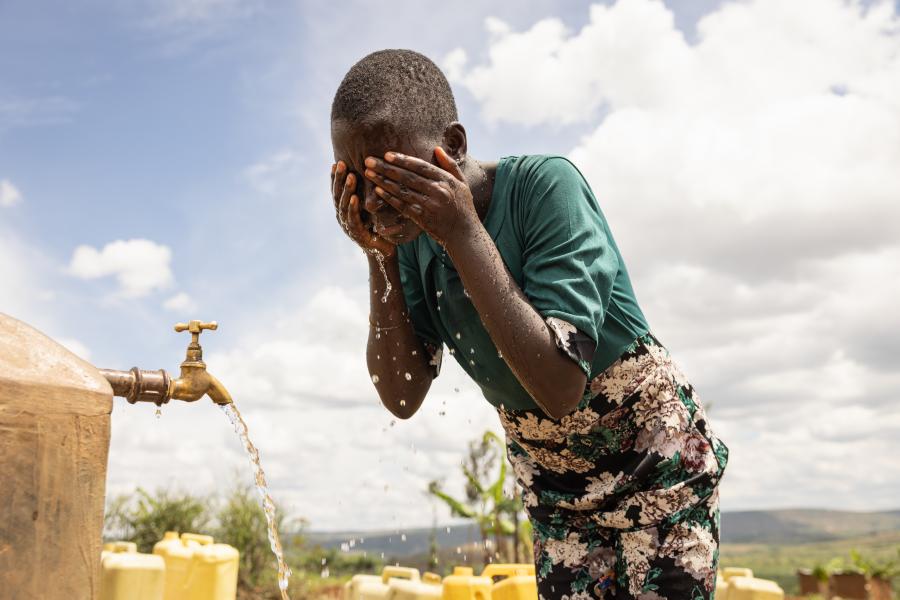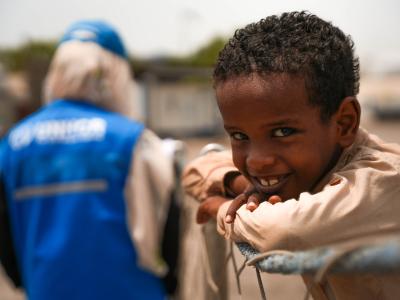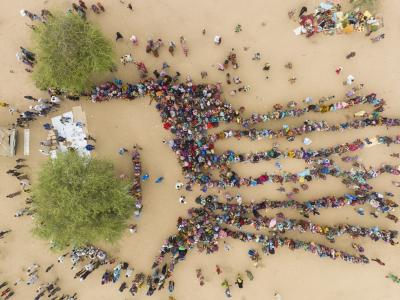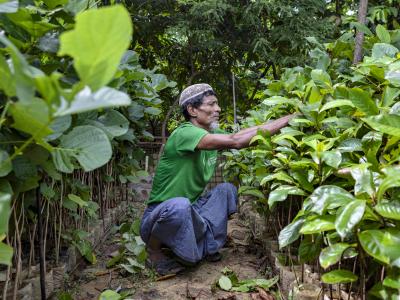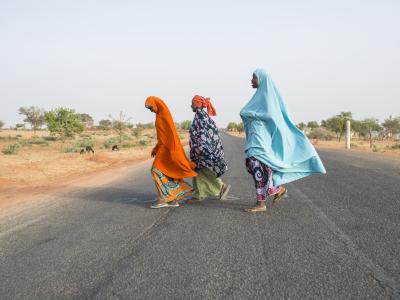Results in 2023
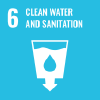
In 2023, UNHCR provided water, sanitation and hygiene (WASH) services in new emergencies and in protracted displacement situations, and advocated on behalf of forcibly displaced people and their host communities for their inclusion in local services and national development plans. In line with its “Operational strategy for climate resilience and environmental sustainability” and the Global Compact for Refugees, UNHCR continued to develop climate resilient and inclusive WASH services.
UNHCR delivered WASH services in 29 countries. 84% of the refugee population in these countries had access to at least basic drinking water services (SDG 6.1.1), a slight improvement from an estimated 81% in 2022. UNHCR’s refugee operations provided an average of 18 litres of water per person per day, slightly less than in 2022 and the minimum daily standard of 20 litres per person for protracted situations. The slight decrease was partially attributable to new, large-scale displacements and the increasing risks to the quantity and quality of water resources. In Sudan’s refugee camps, UNHCR used water trucking and increased pumping hours, as well as upgrading pipes and solar systems, to try to keep up with the influx of secondarily displaced refugees and asylum-seekers after the outbreak of conflict in April 2023.
By the end of 2023, 50% of boreholes in UNHCR’s operations were solarized, up from 46% in 2022, resulting in significant environmental benefits as an estimated 32,000 tons of carbon dioxide (CO2) emissions are avoided annually due to reduced diesel consumption. Beyond the positive environmental effects, solar solutions have lower operating costs and ensure that remote field locations are less dependent on fuel deliveries. Project Flow developed solar designs for 38 water systems and 10 healthcare facilities serving 1.36 million people in Ethiopia, Mauritania, Rwanda, South Sudan, Sudan and Zambia. Solarization of selected systems will occur in 2024, with the potential to reduce CO2 emissions by 2,000 tons per year.
By the end of 2023, UNHCR had deployed 1,200 smart water sensors and 40% were installed in 10 countries, mainly in Africa. The sensors monitor groundwater and provide data to help prevent depletion of aquifers. They also support the rapid identification of leaks and technical issues, thereby minimizing water wastage. The complexities experienced in progress of the installations reflect the complexity of management of these water systems, and thus the benefit to be gained from this remote monitoring system.
Progress was made in sanitation, with an estimated 63% of refugees having access to a safe household toilet in 28 countries where UNHCR operates, up from 53% in 2022. In Bangladesh, for example, UNHCR supported the construction of 23,000 latrines, and in Sudan, despite the emergency, UNHCR managed to construct 1,455 emergency communal latrines and upgrade 530. However, the global proportion of refugees with access to a safe household toilet remained well below the target of at least 85%. On average, one toilet was shared by 18 people. Enhanced faecal sludge management for improved environmental outcomes continues to be developed in UNHCR operations, as in Bangladesh, where a third large-scale faecal sludge treatment plant was constructed, and in Cameroon, where compost from latrine sludge was used in agriculture.
In line with the Global Compact on Refugees, UNHCR worked with governments, donors and development actors to support inclusion of the refugee population in the national agenda, including working with Mozambique’s refugee agency (INAR) on geophysical studies for water supplies in Mozambique and the implementation by UNHCR and UNICEF of the utility-led “whole-of-society” R-WASH project in Ethiopia, Sudan and Somalia.
Core indicators

12.1 Proportion of people using at least basic drinking water services

12.2 Proportion of people with access to a safe household toilet
Challenges to achieving outcomes
UNHCR worked consistently to provide WASH services across its operations, but there were challenges in many countries, gaps remained, and minimum standards were not universally met.
In 69% of settlements in countries where UNHCR has WASH programmes, the standard of 20 litres of water per person per day was not reached, often as a result of insufficient funding. For instance, in Cameroon, Chad, Kenya, Sudan and Uganda, a lack of operations and maintenance and ageing infrastructure contributed to water system inefficiencies and inadequate water supply, problems which were often compounded by new arrivals.
The standard of at least 85% of households with a household toilet (SDG 6.2.1) was reached in only 6% of settlements. Inadequate management of sludge in pit latrines (including untimely emptying of pits, insufficient numbers of latrines for new influxes which resulted in filling of pits significantly faster than planned, collapse of pits, etc) and diversion of resources to new displacements significantly affected this target, for instance, in Cameroon, Chad, Ethiopia, Malawi and Sudan.
The lack of adequate and safe WASH facilities contributed to increased water-related diseases, including diarrhoea, outbreaks of cholera, and skin infections. Protection risks, particularly for women and girls, were exacerbated by the need to travel longer distances to collect water and by the gaps in private, accessible and safe sanitation facilities.
The increasing impact of climate change, such as floods and drought, hindered UNHCR’s efforts to meet the minimum standards. During 2023, floods damaged water and sanitation infrastructure in Cameroon, Kenya and the United Republic of Tanzania, whilst increasing drought and deteriorating water quality affected the volume and quantity of water supplied to refugees in Kenya, Nigeria, South Sudan and Uganda.
Financial overview
Global expenditure and budget for Clean water, sanitation and hygiene
$92 million spent against a budget of $258 million
$166 million of unmet needs or 64% of the budget

Sony Group Corporation commits to strengthening refugee health and access to safe water through Japan for UNHCR
Sony made a three-year commitment (2023-2025), contributing $6 million from its Global Relief Fund for COVID-19 to support UNHCR in enhancing refugees’ access to health, clean water, sanitation and hygiene in Bangladesh and the southern Africa region.
This will bring improvements in hygiene and health outcomes for both refugee and host communities, helping to build community resilience to the impact of future pandemics and epidemics.
